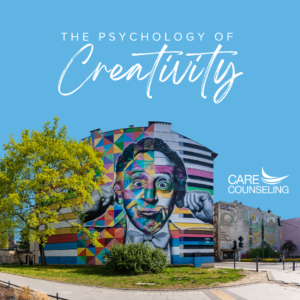Exploring the Psychology of Creativity
 Creativity is a remarkable human ability that drives innovation, expression, and problem-solving. But what goes on in the minds of creative individuals? In this blog post, we will dive into the captivating realm of the psychology of creativity. We will explore the cognitive and emotional processes involved in creativity, investigate techniques for overcoming creative blocks, and delve into the intricate relationship between mental health and the creative experience.
Creativity is a remarkable human ability that drives innovation, expression, and problem-solving. But what goes on in the minds of creative individuals? In this blog post, we will dive into the captivating realm of the psychology of creativity. We will explore the cognitive and emotional processes involved in creativity, investigate techniques for overcoming creative blocks, and delve into the intricate relationship between mental health and the creative experience.
Creativity involves the generation of novel ideas, solutions, and expressions. The cognitive process of creativity is complex and often involves divergent thinking. Divergent thinking is the ability to think flexibly, generate multiple ideas, and make unconventional connections. It involves breaking free from traditional thought patterns and exploring different perspectives.
Overcoming Creative Blocks:
Creative blocks are barriers that impede the flow of creative ideas and inspiration. They can arise from various factors, such as self-doubt, fear of judgment, or a lack of inspiration. Overcoming creative blocks requires a combination of techniques:
- Mindfulness and Relaxation: Engaging in mindfulness practices and relaxation techniques can quiet the mind, reduce anxiety, and create space for new ideas to emerge.
- Changing Perspectives: Exploring new environments, seeking diverse experiences, and exposing oneself to different perspectives can ignite fresh insights and spark creativity.
- Embracing Failure and Iteration: Recognizing that failure is a natural part of the creative process allows individuals to learn, adapt, and improve their ideas. Embracing failure as a steppingstone to success helps overcome the fear of making mistakes.
The link between mental health and creativity has been a subject of interest among researchers. While mental health challenges can be barriers to creativity, creative outlets can also serve as a source of catharsis and self-expression for individuals experiencing emotional distress. Some key considerations include:
- Mood Disorders and Creativity: Research suggests a higher prevalence of mood disorders, such as depression and bipolar disorder, among creative individuals. Although not all creative individuals experience mental health challenges, there seems to be a connection between heightened emotional intensity and creative expression.
- Flow State and Creativity: Flow state refers to a state of deep absorption and focused engagement in a task. It is characterized by a sense of timelessness and effortless concentration. Experiencing flow can enhance creativity and well-being, as it allows individuals to fully immerse themselves in the creative process.
- Creative Outlets as Coping Mechanisms: Engaging in creative activities, such as art, music, or writing, can provide a sense of purpose, meaning, and emotional release. It can serve as a form of self-expression, allowing individuals to channel their emotions and find solace in their creative pursuits.
The psychology of creativity offers fascinating insights into the cognitive and emotional processes that drive innovation and self-expression. By understanding the cognitive aspects of creativity, embracing techniques to overcome creative blocks, and recognizing the complex relationship between mental health and creativity, individuals can unlock their creative potential and find joy in their artistic endeavors. Whether as a professional artist or a creative hobbyist, exploring the depths of creativity can enrich our lives, promote well-being, and cultivate a unique outlet for self-expression.



























